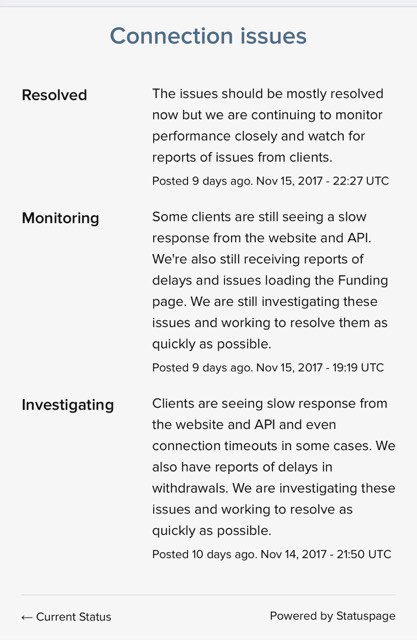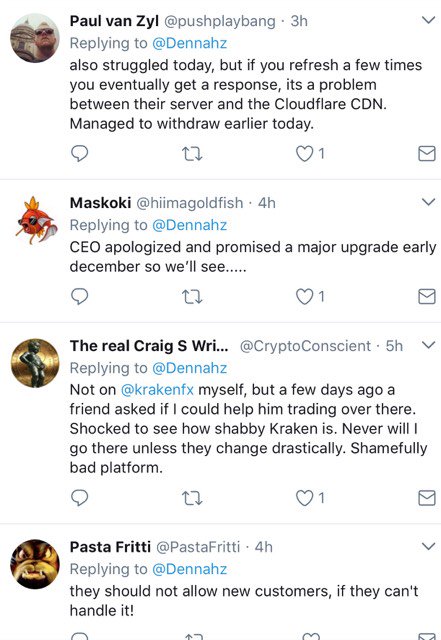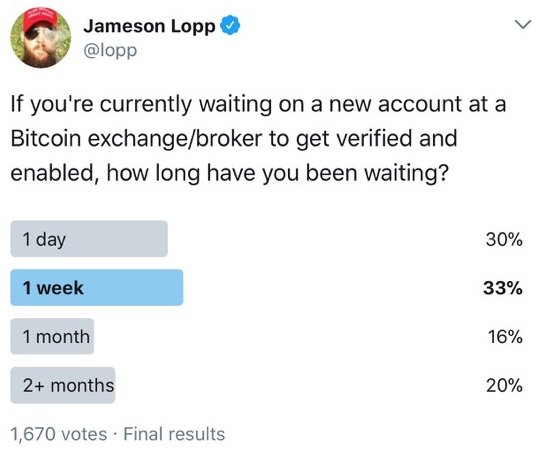Bitcoin exchanges are feeling growth pains: locking up customers’ accounts, taking too long to onboard new clients, and sometimes making a mess of enthusiasts’ experience with money’s brave new future. Cryptocurrencies are already a quarter trillion dollar market. Customers of popular exchanges are beginning to notice problems, and are protesting vocally.
Also read: Bitcoin Exchange Bitstamp Gets Masterpayment, Cuts Fees to 5%
Close to 70% Wait 1 Week+ at Bitcoin Exchanges
Bitcoin influencer and personality Jameson Lopp revealed results of an informal Twitter survey in which over 1,600 votes were cast.
Putting aside the 1 day anomaly, results tallied almost 7 out of every 10 exchange customers spending a week or longer waiting to be “verified and enabled.”

Business Insider recently noted, “Kraken is one of the four crypto-exchanges that is set to contribute to the Chicago Mercantile Exchange index,” and yet “customers of Kraken, one of the largest crypto-exchanges in the world, experienced delays and connection time-outs triggered by record-high volumes,” reports Frank Chaparro.
During an interview, Kraken CEO Jesse Powell answered: “We are hiring in almost every function. In addition to developers, which we are always actively hiring, we are looking to bring on a VP of engineering, regulatory affairs counsel.”
Anecdotal Evidence Abounds
For sure volume has played a role in congestion; bitcoin exchanges swing from 1 to 5 billion USD daily. However, that is relative peanuts when put alongside institutional exchanges that can trade in the trillions.
A surf over to Consumer Federal Protection Bureau, typing in Coinbase, for example, scores of complaints surface. Gemini during the Summer experienced “production outages.” Tether receives consistently low marks across social media.

Speed is everything in terms of riding the current speculative wave in crypto prices. Miss a day, much less a week, and a potential investor could be out thousands by virtue of nothing more than scaling issues.
In fairness, it does seem all exchanges are having these problems, and it could be in part due to frictions caused by know-your-customer (KYC) and anti-money laundering (AML) laws. Traditional bank accounts are often on the other end of these services, and perhaps they’re less than enthused about the prospect of crypto. Also, larger exchanges by definition will have more complaints.
Bitcoin veterans are suggesting more peer-to-peer activity and less reliance on third-party exchanges. Localbitcoins is an often-cited remedy. Many bitcoiners are lamenting the banking of bitcoin, which appears counter to the very reason for its existence.
The Road Ahead
As legacy institutional creep shadows into the crypto ecosystem, professional analysts continue to chirp about welcoming “a more sophisticated exchange presence,” with regard to bitcoin exchanges, as the present players “do not offer the same quality of technology as the large global exchange groups,” according to Bank of America Merrill Lynch.
And they could not. Traditional exchanges have had decades of a head start, massive tax money bailouts, and often lobby to craft laws which insulate them from competition.

The delicate balance for crypto enthusiasts will be to keep frictionless and freeing aspects of currencies such as bitcoin alive while accepting seemingly inevitable mainstreaming.
However that is done, exchanges play a key role.
What are your experiences with bitcoin exchanges? Tell us in the comments below!
Images courtesy of: Pixabay, Twitter, Kraken. Jamie Redman and Kai Sedgwick contributed sourcing.
We got it all at Bitcoin.com. Do you want to top up on some bitcoins? Do it here. Need to speak your mind? Get involved in our forum. Wanna gamble? We gotcha.
The post Mo’ Money, Mo’ Problems: Bitcoin Exchanges Struggle Under Growth Explosion appeared first on Bitcoin News.















